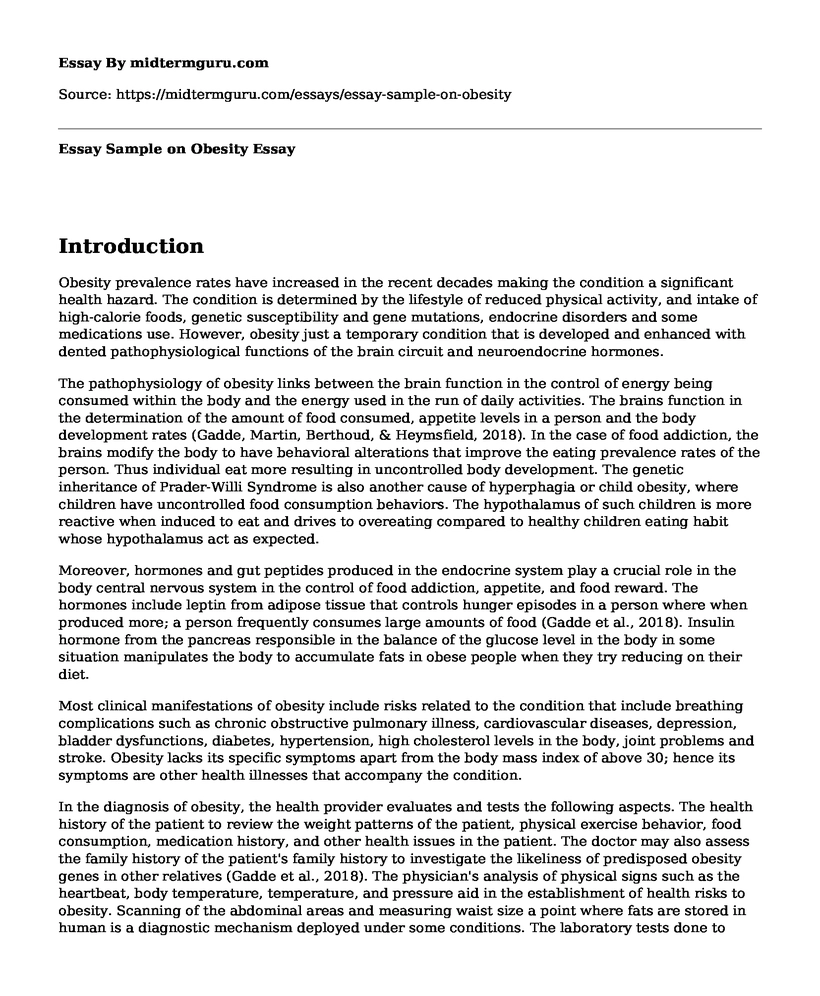Introduction
Obesity prevalence rates have increased in the recent decades making the condition a significant health hazard. The condition is determined by the lifestyle of reduced physical activity, and intake of high-calorie foods, genetic susceptibility and gene mutations, endocrine disorders and some medications use. However, obesity just a temporary condition that is developed and enhanced with dented pathophysiological functions of the brain circuit and neuroendocrine hormones.
The pathophysiology of obesity links between the brain function in the control of energy being consumed within the body and the energy used in the run of daily activities. The brains function in the determination of the amount of food consumed, appetite levels in a person and the body development rates (Gadde, Martin, Berthoud, & Heymsfield, 2018). In the case of food addiction, the brains modify the body to have behavioral alterations that improve the eating prevalence rates of the person. Thus individual eat more resulting in uncontrolled body development. The genetic inheritance of Prader-Willi Syndrome is also another cause of hyperphagia or child obesity, where children have uncontrolled food consumption behaviors. The hypothalamus of such children is more reactive when induced to eat and drives to overeating compared to healthy children eating habit whose hypothalamus act as expected.
Moreover, hormones and gut peptides produced in the endocrine system play a crucial role in the body central nervous system in the control of food addiction, appetite, and food reward. The hormones include leptin from adipose tissue that controls hunger episodes in a person where when produced more; a person frequently consumes large amounts of food (Gadde et al., 2018). Insulin hormone from the pancreas responsible in the balance of the glucose level in the body in some situation manipulates the body to accumulate fats in obese people when they try reducing on their diet.
Most clinical manifestations of obesity include risks related to the condition that include breathing complications such as chronic obstructive pulmonary illness, cardiovascular diseases, depression, bladder dysfunctions, diabetes, hypertension, high cholesterol levels in the body, joint problems and stroke. Obesity lacks its specific symptoms apart from the body mass index of above 30; hence its symptoms are other health illnesses that accompany the condition.
In the diagnosis of obesity, the health provider evaluates and tests the following aspects. The health history of the patient to review the weight patterns of the patient, physical exercise behavior, food consumption, medication history, and other health issues in the patient. The doctor may also assess the family history of the patient's family history to investigate the likeliness of predisposed obesity genes in other relatives (Gadde et al., 2018). The physician's analysis of physical signs such as the heartbeat, body temperature, temperature, and pressure aid in the establishment of health risks to obesity. Scanning of the abdominal areas and measuring waist size a point where fats are stored in human is a diagnostic mechanism deployed under some conditions. The laboratory tests done to examine obesity include blood tests for cholesterol, starvation glucose, and heart tests on the electrocardiogram. When the cholesterol levels are found to be high, the patient is declared obese.
The collection of information is crucial in the determination of the therapeutic intervention to be used in the treatment of the condition. The most viable treatment for obesity involves the change of lifestyle of the patient. The evolution of lifestyle requires a multidimensional and trans-disciplinary approach that deploys the knowledge of a dietitian, obesity specialist, behavior advisor, and physical exercising instructor (Gadde et al., 2018). The tools implemented in the treatment include changing the meals the victim consumes to fewer calorie foods and regulated eating occasions. The patient is also prescribed to weight loss plan through behavior change and induction of exercising activities in the daily life of the patient. The technique is vital in the rectification of the brains central nervous system to accept changes in eating to active life thus; the pathophysiological mechanism underlying obesity condition is rectified. The evolution of lifestyle does not only improve the physical attribute of the patient but also enhance on the psychological facet to stir the weight reduction.
Conclusion
In conclusion, to mark that obesity is just a condition in human life, when a change of lifestyle intervention procedure adheres. It produces significant results to retain normal body weight in the patient and the end, live life as those in average body weight range.
References
Chand, S. (2014). Nausea and vomiting in palliative care. Retrieved from https://www.pharmaceutical-journal.com/learning/learning-article/nausea-and-vomiting-in-palliative-care/11135047.article?firstPass=false
Gadde, K., Martin, C., Berthoud, H., & Heymsfield, S. (2018). Obesity. Journal Of The American College Of Cardiology, 71(1), 69-84. doi: 10.1016/j.jacc.2017.11.011
McCance, K. A. & Huether, S.E. (2010). Pathophysiology: The biologic basis for disease in adults and children (7th ed.). St. Louis: Mosby.
Cite this page
Essay Sample on Obesity. (2022, Sep 28). Retrieved from https://midtermguru.com/essays/essay-sample-on-obesity
If you are the original author of this essay and no longer wish to have it published on the midtermguru.com website, please click below to request its removal:
- Questions and Answers on Benchmarking - Paper Example
- Research Paper on Type 1 Diabetes
- A Comparative Study of Social Media Platforms Used by the Well-Being Sector
- Employee Insurance in Germany: Deduction, Funds, and Coverage - Essay Sample
- Integumentary System: Skin, Sensors, Anatomy & Function - Essay Sample
- County Health Rankings: Grading US Counties on Health Status - Essay Sample
- PEN-3 Model: A Comprehensive Approach to Health Challenges - Essay Sample







